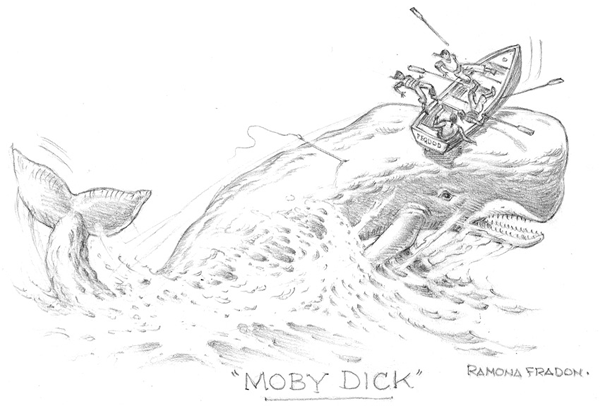A Good Story

A Random Starting Point
t seemed the great Black Parliament sitting in Tophet. A hundred black faces turned round in their rows to peer; and beyond, a black Angel of Doom was beating a book in a pulpit. It was a negro church; and the preacher's text was about the blackness of darkness, and the weeping and wailing and teeth-gnashing there. Ha, Ishmael, muttered I, backing out, Wretched entertainment at the sign of 'The Trap!'
Moving on, I at last came to a dim sort of light not far from the docks, and heard a forlorn creaking in the air; and looking up, saw a swinging sign over the door with a white painting upon it, faintly representing a tall straight jet of misty spray, and these words underneath—"The Spouter Inn:—Peter Coffin."
What Happened Then?
offin?—Spouter?—Rather ominous in that particular connexion, thought I. But it is a common name in Nantucket, they say, and I suppose this Peter here is an emigrant from there. As the light looked so dim, and the place, for the time, looked quiet enough, and the dilapidated little wooden house itself looked as if it might have been carted here from the ruins of some burnt district, and as the swinging sign had a poverty-stricken sort of creak to it, I thought that here was the very spot for cheap lodgings, and the best of pea coffee.

It was a queer sort of place—a gable-ended old house, one side palsied as it were, and leaning over sadly. It sto od on a sharp bleak corner, where that tempestuous wind Euroclydon kept up a worse howling than ever it did about poor Paul's tossed craft. Euroclydon, nevertheless, is a mighty pleasant zephyr to any one in-doors, with his feet on the hob quietly toasting for bed. "In judging of that tempestuous wind called Euroclydon," says an old writer—of whose works I possess the only copy extant—"it maketh a marvellous difference, whether thou lookest out at it from a glass window where the frost is all on the outside, or whether thou observest it from that sashless window, where the frost is on both sides, and of which the wight Death is the only glazier." True enough, thought I, as this passage occurred to my mind—old black-letter, thou reasonest well. Yes, these eyes are windows, and this body of mine is the house. What a pity they didn't stop up the chinks and the crannies though, and thrust in a little lint here and there. But it's too late to make any improvements now. The universe is finished; the copestone is on, and the chips were carted off a million years ago. Poor Lazarus there, chattering his teeth against the curbstone for his pillow, and shaking off his tatters with his shiverings, he might plug up both ears with rags, and put a corn-cob into his mouth, and yet that would not keep out the tempestuous Euroclydon. Euroclydon! says old Dives, in his red silken wrapper—(he had a redder one afterwards) pooh, pooh! What a fine frosty night; how Orion glitters; what northern lights! Let them talk of their oriental summer climes of everlasting conservatories; give me the privilege of making my own summer with my own coals.

But what thinks Lazarus? Can he warm his blue hands by holding them up to the grand northern lights? Would not Lazarus rather be in Sumatra than here? Would he not far rather lay him down lengthwise along the line of the equator; yea, ye gods! go down to the fiery pit itself, in order to keep out this frost?
Now, that Lazarus should lie stranded there on the curbstone before the door of Dives, this is more wonderful than that an iceberg should be moored to one of the Moluccas. Yet Dives himself, he too lives like a Czar in an ice palace made of frozen sighs, and being a president of a temperance society, he only drinks the tepid tears of orphans.
But no more of this blubbering now, we are going a-whaling, and there is plenty of that yet to come. Let us scrape the ice from our frosted feet, and see what sort of a place this "Spouter" may be.
And So It Goes

ntering that gable-ended Spouter-Inn, you found yourself in a wide, low, straggling entry with old-fashioned wainscots, reminding one of the bulwarks of some condemned old craft. On one side hung a very large oilpainting so thoroughly besmoked, and every way defaced, that in the unequal crosslights by which you viewed it, it was only by diligent study and a series of systematic visits to it, and careful inquiry of the neighbors, that you could any way arrive at an understanding of its purpose. Such unaccountable masses of shades and shadows, that at first you almost thought some ambitious young artist, in the time of the New England hags, had endeavored to delineate chaos bewitched. But by dint of much and earnest contemplation, and oft repeated ponderings, and especially by throwing open the little window towards the back of the entry, you at last come to the conclusion that such an idea, however wild, might not be altogether unwarranted.